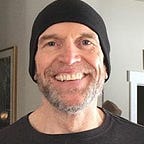Knowledge, Conviction, and Belief [3]
We’ve been talking about dualistic thinking — the kind that leads us to think we live simultaneously in two realities.
Reality A is “life in the flesh” — bound by space and time and all the imperfections of what it means to be human. It is life carried on in our physical bodies, where our impressive but ultimately limited brains are in charge.
Reality B is “life in the spirit” — the eternal, perfect, transcendent, idealized, supernatural, original source that informs, explains, and guides its poorer counterpart.
This dualistic thinking says there’s more to life than meets the eye, that humans are an “eternal soul having a worldly existence.” The dualism set ups a cascade of derivative beliefs, for example:
There’s a difference between the Reality A identity and experience we actually have and the Reality B identity and experience we would have if we could rise above Reality A and live up to the idealized version of Reality B.
Every now and then, somebody gets lucky or gets saved or called, and gets to live out their Reality B destiny, which gives them and their lives a heightened sense of purpose and meaning.
But those are the chosen few, and they’re rare. For most of us, our ordinary selves and mundane lives are only a shadow of our “higher selves” and “greater potential.”
The chosen few can — and often do — provide guidance as to how we can do better, and we do well to find some compatible relation with one of more of them, but sometimes, in the right setting and circumstance, we might discover that we have receptors of our own that can receive signals from Reality B. We call this “enlightenment” or “conversion” or “salvation” or something like that, and it’s wonderful, blissful, and euphoric.
But most of the time, for the vast majority of us, Reality A is guided by a mostly one-way communication with Reality B — a sort of moment-by-moment data upload from A to B, where everything about us and our lives — every conscious and subconscious intent, motive, thought, word, and deed — gets stored in a failsafe beyond-time data bank. When our Reality A lives end, those records determine what happens next — they inform our next trip through Reality A, or set the stage for Reality B existence we’re really going to like or we’re really going to suffer.
Everybody pretty much agrees it’s useful to have good communication with or awareness of Reality B, because that helps us live better, truer, happier, more productive lives in Reality A, and because it creates a better data record when our Reality A existence ends and we pass over to Reality B.
And on it goes. No, we don’t express any of it that way: our cultural belief systems and institutions — religious doctrines, moral norms, legal codes, academic fields of study, etc. — offer better- dressed versions. But it’s remarkable how some version of those beliefs finds its way into common notions about how life works.
At the heart of it all is our conviction — not knowledge — that this thing we consciously know as “me” is an independent self that remains intact and apart from the biological messiness of human life, able to choose its own beliefs, make its own decisions, and execute its own actions. In other words, we believe in consciousness, free will, and personal responsibility for what we are and do — and what we aren’t and don’t do — during what is only a sojourn — a short-term stay — on Earth.
Those beliefs explain why, for example, it bothers us so much when someone we thought we knew departs from their beginnings and instead displays a changed inner and outer expression of who they were when we thought we knew them. “Look who’s in the big town,” we say. Or we pity them and knock wood and declare thank goodness we’ve been lucky. Or we put them on the prayer chain or call them before the Inquisition… anything but entertain the idea that maybe Reality B isn’t there- along with all the belief it takes to create it — and that instead all we have is Reality A — we’re nothing but flesh and bone.
It’s almost impossible to think that way. To go there, we have to lay aside conviction and embrace knowledge.
Almost impossible.
Almost.
We’ll give it a try in the coming weeks.
Originally published at http://iconoclast.blog on September 27, 2019.
